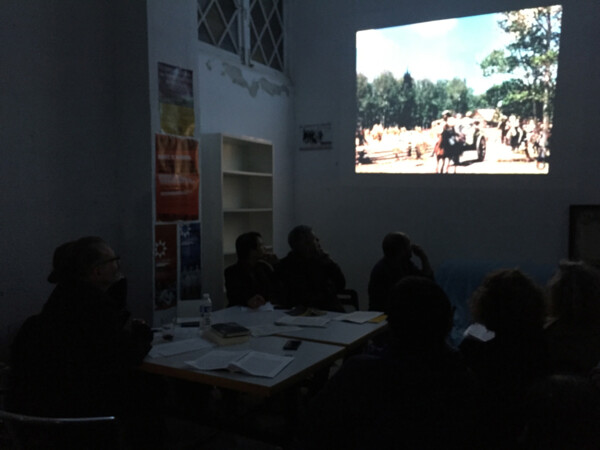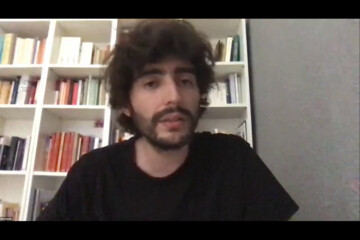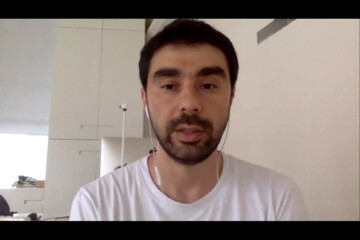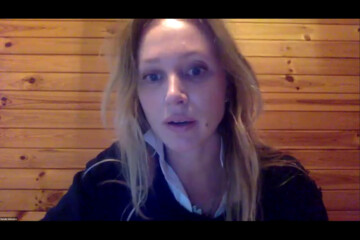Speaking of it, approaching its edges, playing somewhat riskily with its reverberations turns out to be irresistible when the relation between → solidarity and commons is at play. Especially when what is irresistible lies not in the term itself but around it, in that which disrupts, provokes, and arouses its surroundings.
Beyond its root, which comes from the Greek term haptikos and refers to that which pertains to the sense of touch, this term appears in Harney and Moten’s book The Undercommons, published in 2013[1]. Specifically, it appears in the chapter about logistics, entitled “Fantasy in the Hold”, where it takes on a particularly stimulating power. To approach the authors’ intention one must understand the body of the text as a machine operating at many levels, in which there is no one explanation, answer, or definition, but rather a deployment of mechanisms making different things work.
And in order to approach this embodied and → situated theory and practice of the undercommons, to touch and feel what it is about, to see how it works and what already-working elements are woven into its mechanisms, an experience of contact with the text took place in February 2017 in Málaga, when an informal reading group came together that worked through the text and also began to → translate it, in the movements room at La Casa Invisible. (Figure 21) La Casa Invisible is an occupied social and cultural centre in the historic centre of Málaga that started its activities in 2007 by re-appropriating a small palace that was built in 1876 and abandoned at the beginning of the new millennium. The space has served as the centre of operations for many social movements. It has also functioned as a meeting space and birthplace for hundreds of initiatives, platforms, groups, campaigns, and social activities, an aggregator of alternative cultural activities, and a space for artistic experimentation. Surely, however, the most important thing is the distinct sociality that comes into existence in its courtyard, corridors, and enclaves, a form of living together that is disobedient toward the mandates of neoliberalism. Today, La Casa Invisible is a space under threat in an urban centre that in the last decade has turned into a virtual theme park,[2] cornered by the franchise museums that have sprung up around the Picasso brand to strengthen the city’s tourist industries, and stripped of a neighbourly social fabric by abrupt increases in rental prices.

First session of the reading group organised around The Undercommons on 13 February 2017 in the movements room at La Casa Invisible, watching a scene from the movie Drums Along the Mohawk, 1939 1´44´´. ??
When Harney and Moten write of study, they do so with reference to this sociality, to the fact that it involves a “common intellectual practice”. This does not just mean that study happens outside of class – at the university or in the study or reading group – but rather that it is precisely what is around, beneath, before, and after that which we understand strictly as the moment of study where study really takes place. Like in the small informal groups that take shape among students before class or in conversations in a bar after a reading group. Study as “what you do with other people. It’s talking and walking around with other people, working, dancing, suffering, […] playing in a band, in a jam session, or old men sitting on a porch, or people working together in a factory”. [3] And in all these activities a sociality is created that is already an intellectual practice. So referring to the reading group around The Undercommons is not so much to speak of its debates or of the text itself, but of the connections between the concepts developed in the text and a sociality that exists – and already existed – in the different spaces of La Casa Invisible and in very different micro-practices of general antagonism across the city. As Harney reminds us in his interview with Stevphen Shukaitis, “a kind of comportment or ongoing experiment with and as the general antagonism, a kind of way of being with others”.[4]
This doing with others or way of being with others is a sociality that cannot be separated from problems and things that do not work well, and which does not require a call to order in order to work. The call to order is the moment the sociality out of which study emerges is cut off, as in Harney and Moten’s example of a class before the instructor arrives and calls the students to order so that the class can begin, or at a concert when the tuning up has ended and the show can start. However, it is precisely when there is no call to order that the most interesting things occur, when there is no cut between the informal and formal, when the whispering, the greetings, the → rehearsal can, without interruption and without a call to order, lead to the concert. Where the exact moment when the concert or the class begins is unknown, and study occurs as much in the preceding informality as when informality coheres into a form, and extends towards a formality. “It’s just about not being cut off like that; to study the general antagonism from within the general antagonism.”[5] While the tendency of the university and many educational institutions is to correct and insulate themselves from this sociality, study not only cannot be separated from it, but takes it as a point of departure. As Moten explains, “form is not the eradication of the informal. Form is what emerges from the informal”’[6] And hapticality plays a very important role in this emergence – it is the tact and sensibility to soften those boundaries in doing with others and in the way of being with others.
On the other hand, undercommon sociality departs from a problematisation of individuality and the commons. Traditionally, the commons have been theorised as a convergence of resources and relationships that create, protect, and manage themselves. What Harney and Moten point out is that this convergence of relationships and resources – the so-called commons – is presented as a state achieved by individuals who decide to enter into relations through the commons. The problem is that the individuals-in-relation create “not just commons, but states and nations”.[7] Without getting rid of the individual – including the idea of individuals in relation – it is impossible to create commons. Undercommon sociality breaks with this individualistic conception, because it departs from and works with what is beneath processes of individuation. In the informality that is already here, before the call to order, before the moment of regulation, of correction, of settlement. If the idea is to speak and create commons out of solidarity, the individual moment that is normally passed along the way to making or conceiving anything must be done away with. Undercommon sociality is what really and materially creates commons because it is not necessary to protect, manage, or create anything, but rather to join together, → care (→ care), have contact, be sensitive, and experiment with what is already here, with what is already happening. Like in the song “What’s Going On?” by Marvin Gaye, as Moten recalls, where the “song emerges out of the fact that something already was going on”,[8] where the voice of Marvin Gaye is an extension of the multiplicity of the informal voices and conversations of the first seventeen seconds – and others that were not recorded. And extending this problematisation, the undercommons cannot be a we or an ours – the first as it never ends up closing itself off as a concrete collectivity or community, and the second because it is not a possession – not even a self-possession. It is a sociality that remains dispossessed and always in movement, centred on the relational experience of between. It is not born of nothing, but emerges from that which is already happening between things, like a → constellation of micropractices of the between.
Harney and Moten say that “to work today is to be asked, more and more, to do without thinking, to feel without emotion, to move without friction, to adapt without question, to translate without pause, to desire without purpose, to connect without interruption”.[9] This is how the chapter “Fantasy in the Hold” begins, where the authors begin by writing about logistics and end by infecting us with hapticality. Logistics, according to the authors, is the dominant capitalist new science that aims to undo the subject. Traditionally, business innovations have taken place in the realm of strategy, with logistics following course, but now logistics is what dictates. In an algorithmic alliance between financialisation and logistics, capital advances its fantasy of power to “exist without labour”.[10] Logistics attempts “to connect without going through the subject, to subject without handling things”,[11] and it is not limited to concrete innovations in the business world, as in the recent trend of dropshipping – selling products without at all touching, storing, or seeing them. In a counter-revolution in the face of labour-power, it produces “an entity hooked into financial affects in a way that makes it more logistical than a strategic subject”.[12] This idea, now algorithmically perfected, is in fact grounded in the plundering and primitive accumulation carried out by the Atlantic slave trade, with people transported as mercenary workers, which is to say as just another object in the hold or the container. Thus, following Harney and Moten, “logistics was always the transport of slavery, not ‘free’ labour”.[13] And that is not all: modernity and its contemporary logisticality[14] are grounded in this necropolitical movement of things. This can be seen in the here and now in the unrestrained violence one side of the Mediterranean exercises toward the other, where Europe not only plunders the resources of Africa that are ceaselessly moved in containers, but also exploits – for example under the plastic of Almería – its inhabitants. Those who embarked in boats on their own are always treated as outlaws by a border regime that criminalises what it deeply desires as slave labour. This is where the cruelty and terror of modern logisticality can be seen and felt – and how the State is at its service.
And it is just on this point that Harney and Moten recall that the undercommon is already here, including in situations of total dispossession. And moreover, it is precisely from this dispossession that hapticality emerges. They explain how blackness, being the place where absolute nothingness converges with the world of things, is also and precisely for this reason where and how the relationality “displaces the already displaced impossibility of a home”.[15] And it is a relationality that goes beyond and beneath the proper, or that which is one’s own, “not simply to be among his own; but to be among his own in dispossession, to be among the ones who cannot own, the ones who have nothing and who, in having nothing, have everything”.[16] Just as the passage from logistics to logisticality presumes an entire crossing, a total dislocation and non-locatability, the passage from the haptic to hapticality implies a non-locatable touch that crosses everything. Moving and being moved by and with others is what happens to the embarked being, but logisticality cannot determine the sense that crosses and moves bodies. This is hapticality. “The hold’s terrible gift was to gather dispossessed feelings in common, to create a new feel in the undercommons.”[17] A sense that cannot be sensed individually or collectively, that is not mine or ours, but is rather a sense of becoming common. Hapticality is this sense “a way of feeling through others, a feel for feeling others feeling you. […] This is the feel that no individual can stand, and no state abide”.[18] That is, a feeling that it is impossible to fix a → territory, state, nation, or history. It is the tactile sense of undercommon sociality, because before all forms of enclosure, but also before all forms of commoning, there is already this being in touch.
Thrown together touching each other we were denied all sentiment, denied all the things that were supposed to produce sentiment, family, nation, language, religion, place, home. Though forced to touch and be touched, to sense and be sensed in that space of no space, though refused sentiment, history and home, we feel (for) each other.[19]
To go into a general antagonism today it seems urgent and necessary to break down many fortifications, not only those external and far away, but also those that are our own and nearby. “That takedown comes in movement, as a shawl”,[20] undercommon layer of delicate touch and unforeseeable turns, “the armour of flight”,[21] hapticality, a new feeling.
Translated from the Spanish by Kelly Mulvaney.






